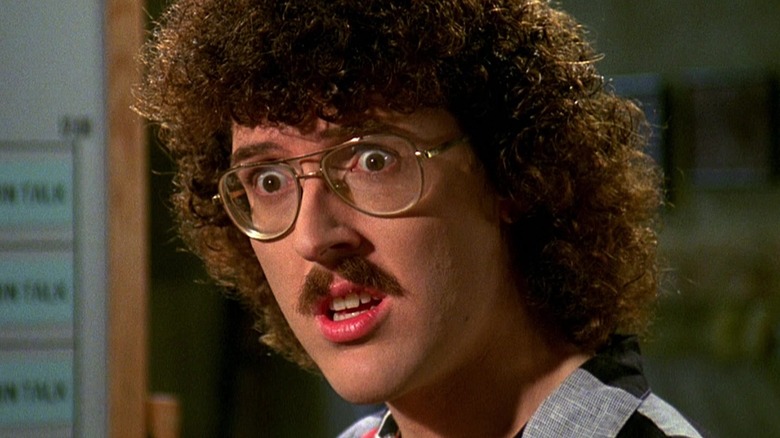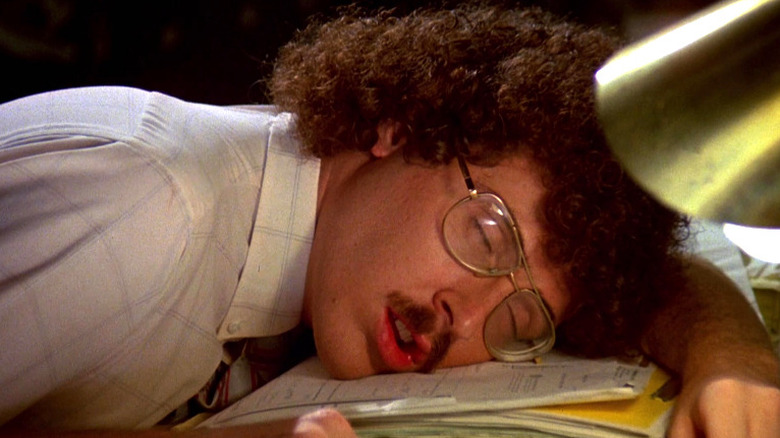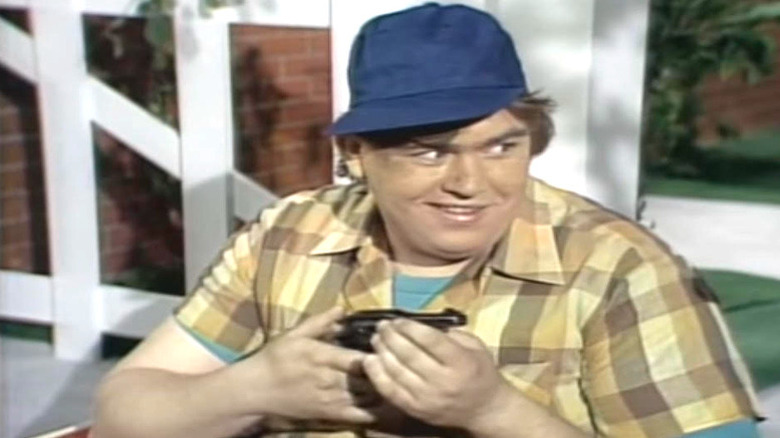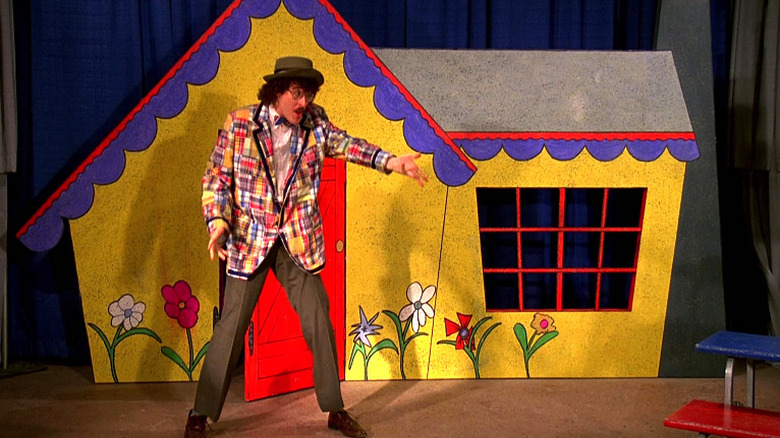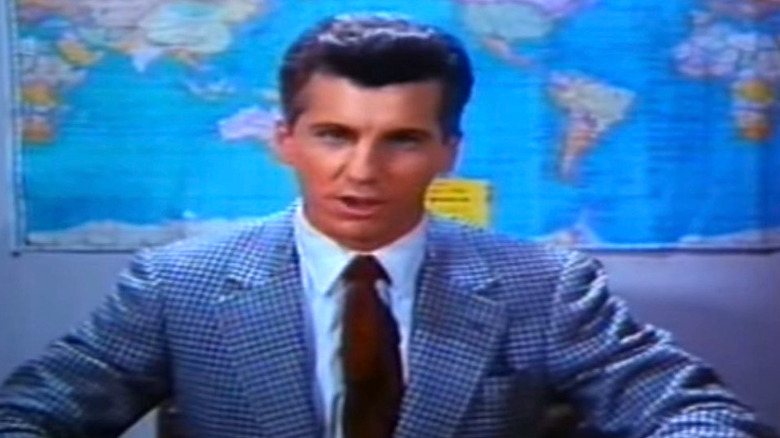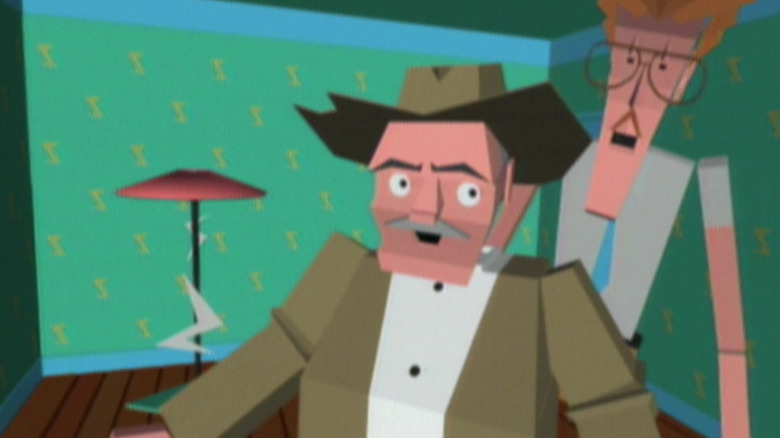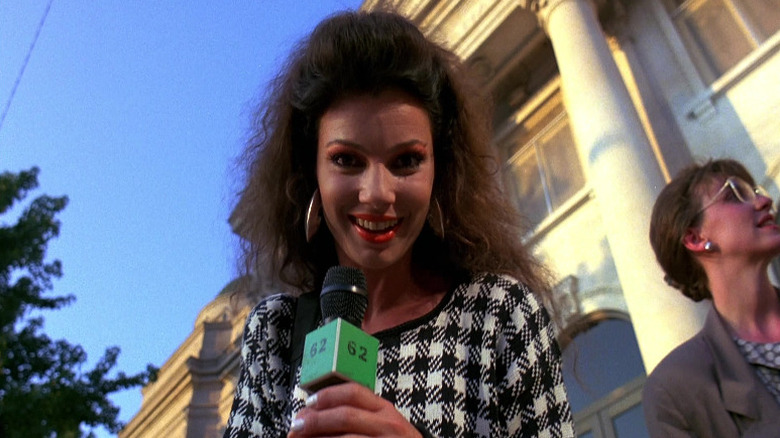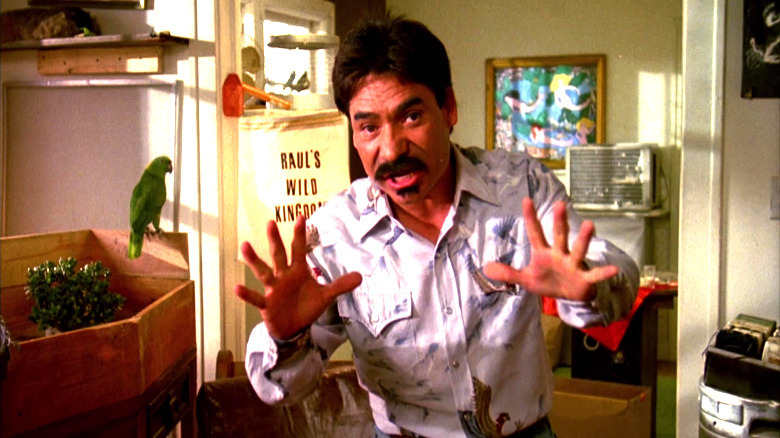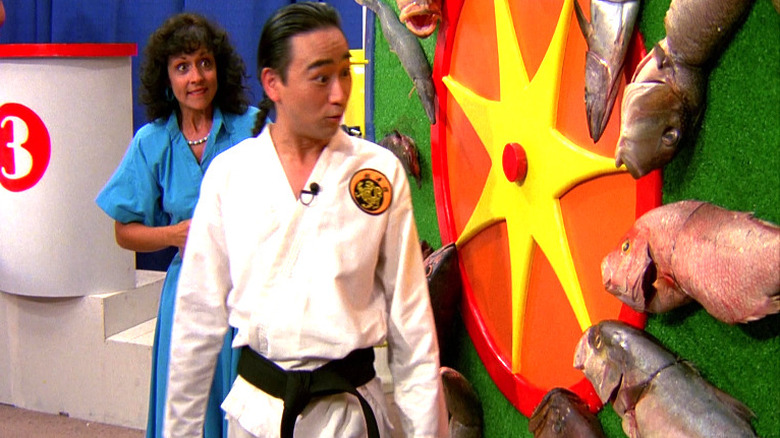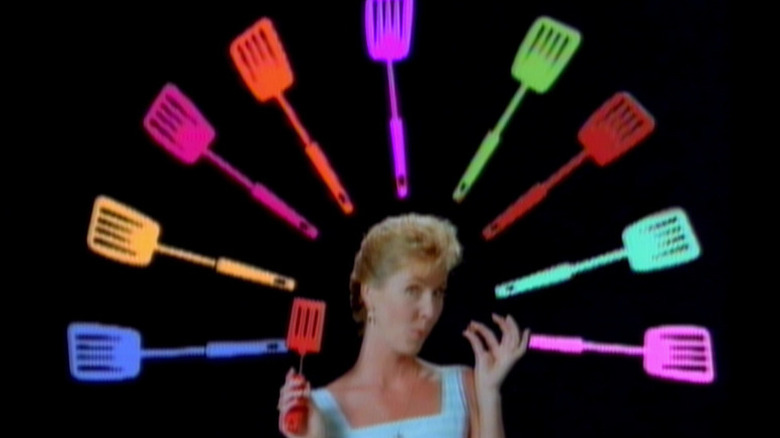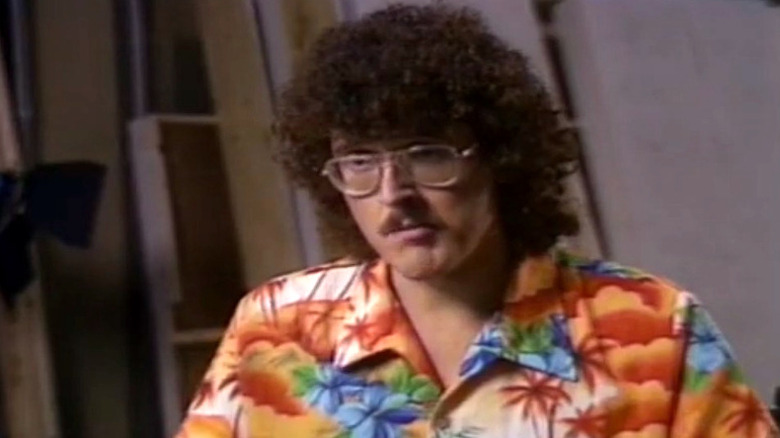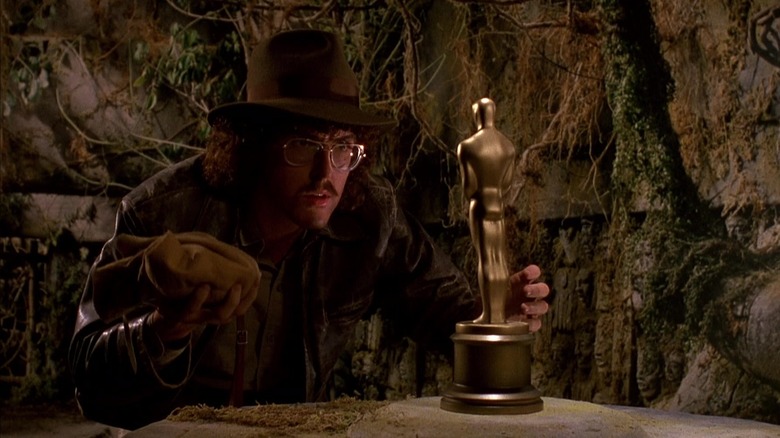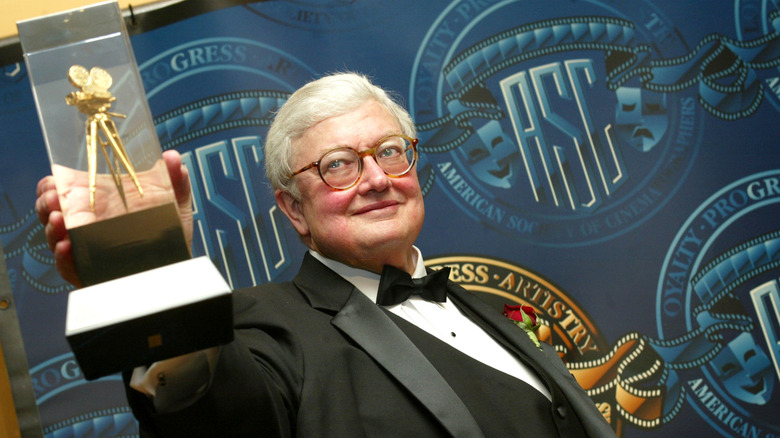What You Probably Never Knew About UHF
Three decades before Daniel Radcliffe would play him in the satirical biopic "Weird: The Al Yankovic Story," the actual "Weird Al" Yankovic was playing a fictional character named George Newman in the "Citizen Kane" of Weird Al movies, "UHF." Like the Orson Welles masterpiece, it wasn't fully appreciated in its time and needed to marinate in the public consciousness for a while before audiences realized it was pretty good.
You couldn't ask for a more perfect Weird Al movie (except, maybe, for the biopic) than this. It has parodies of movies and television, there's a music video in the middle of it, Billy Barty is in it (which is always great), Emo Philips gets covered in blood, and a child drinks from a firehose. That is to say, it is a big, silly, offbeat comedy that suits Yankovic's mainstream (yet somehow esoteric) comedy stylings perfectly.
To celebrate the (kind of) enduring legacy of the film, we're going to look back on the film's production, how some of the cast feels about it today, and the strange reception it had at the time. So, as Weird Al himself says in the film's titular theme song, "Don't change that channel, don't touch that dial" — we're covering everything you probably never knew about "UHF."
The plot didn't matter
The plot of "UHF" isn't exactly complicated. If you haven't seen the film, it goes like this: A directionless young man with a big imagination named George Newman (Al Yankovic) gets hired to manage a local UHF (ultra high frequency) station after his uncle Harvey (Stanley Brock) wins it in a poker game. Utilizing that wacky and wild imagination, George teams up with station janitor Stanley Spadowski (Michael Richards), secretary Pamela Finklestein (Fran Drescher), and his pal, Bob Steckler (David Bowe) and starts to create new programming for the station, turning it into the No. 1 network in the city. R.J. Fletcher (Kevin McCarthy), manager of the local network affiliate, then buys the station to get rid of the competition. Then, it's up to George and all his kooky friends to raise enough money to save their beloved station.
It's your standard cookie-cutter plot that proliferated '80s movies. While some may consider the simplicity of the story to be a flaw, it was actually done by design. During VH1's "Behind the Music," Yankovic discussed that he and his manager, Jay Levey, wanted to do a Weird Al movie for a while. They wound up co-writing the film together (with Levey also directing) with the intent of creating a concept that would allow them to parody commercials, movies, and TV. In response to the critics who trashed the film's story, Yankovic said (on "Behind the Music"), "It wasn't really about that. It was just an excuse to be goofy."
The movie SCTV never made
"UHF" is something of a sketch movie (similar to "And Now for Something Completely Different" from Monty Python and "The Kentucky Fried Movie") with a thin story stringing them together. During the 2014 San Diego Comic-Con panel "The Wonderful World of Weird Al" (included on the 25th-anniversary Blu-Ray), moderator Jonah Ray observed that he's always felt that "UHF" seemed like the kind of movie "SCTV" would have made if they ever made a movie.
He's talking about the legendary sketch comedy series out of Canada that starred Martin Short, John Candy, Catherine O'Hara, Eugene Levy, Rick Moranis (and other icons) called "Second City Television," or "SCTV." The comparison is apt because the show was about all the hilarious programs being broadcast on this tiny television station. It consisted of game show, sitcom, movie, and commercial parodies executed with hilarious precision.
Weird Al agreed with Ray, shedding some light on the inspirations behind Yankovic and the production of "UHF": "'SCTV' was a huge influence," the singer said. "I watched that religiously, as well as 'Monty Python' and everything else. It really informed my comedy."
Oklahoma!
Instead of filming the movie in one of America's metropolitan hubs, the production decided they would move things from the West Coast to the South Central United States, namely Tulsa, Oklahoma. During the film's production, a local media outlet, The Oklahoman, visited the set and had a chat with Weird Al and producer Gray Frederickson. When asked why they chose to film in Tulsa, Frederickson replied, "We've had a lot of good experiences with previous films we've done in Tulsa" — among the films Frederickson is alluding to is Francis Ford Coppola's "The Outsiders," and Frederickson also helped produce Coppola's "Godfather" trilogy and "Apocalypse Now" before partnering with Yankovic. For his part, Weird Al observed about the location, "Tulsa is a great place. All the people have been really nice. They treat me as if I'm human."
Years later, Weird Al returned to Tulsa to promote his book "My New Teacher and Me" and to have a 25th-anniversary screening of the movie. To honor his triumphant return, as reported by "The Laugh Button," Mayor Dewey F. Bartlett, Jr. proclaimed that Sept. 24, 2013, to be "UHF25 Weird Al Yankovic Day" in Tulsa. Yankovic even went on the local news to discuss the book and the screening and to share the official proclamation with the viewers.
Entire jokes and characters were cut
"UHF," like every other movie, had to leave some scenes on the cutting room floor. Whether they slowed the pace of the overall film, added nothing, or weren't funny, these scenes had to go. Usually, though, deleted scenes consist of longer takes, alternate line deliveries, or an added piece of conversation that was ultimately pointless. Every now and then, however, you find that entire characters and subplots have been removed from the finished film.
In the case of "UHF," at least three (technically four) characters were excised. The least impactful omission was a loan officer at a bank who informs George that he can't have a loan. It's easy to see why that was cut since this is information that can be delivered via a line of dialogue. Noel Parenti played a funny, but pointless, character: a doctor who offered free chest X-rays and enemas to donators during the telethon sequence.
Wendye Clarendon played Elaine, a receptionist at the same dental office where George's girlfriend Teri (Victoria Jackson) works as a dental hygienist. Then there's Marco Porella as newsman Fred Parker. His scene was so long and so uninteresting that Yankovic fast-forwards through it on the DVD extras. There was also a running gag that David Proval's villainous character was terrified of bugs, paying off in the film's finale, when he opens a briefcase he thinks is full of money, only to discover it's full of insects.
I want my Hillbillies
One of the highlights of "UHF" is a dream sequence where George falls asleep while watching reruns of "The Beverly Hillbillies," because it nicely transitions into a Weird Al music video right in the middle of the movie. It's a spot-on reimagining of the original Dire Straits video for "Money for Nothing" (sans homophobic lyrics, of course) that depicts both Yankovic's character, George, and Jed Clampett living in a 3D polygon world where the '60s sitcom and a live performance of the song are playing on every TV.
By now, most Weird Al fans know that Dire Straits frontman Mark Knopfler actually played guitar on the song, as Al explained on "Behind the Music." What isn't as well known, is the fact that the original script didn't include the song, and it wasn't even supposed to be a parody of "Money for Nothing." During a Q&A, Al explained that the script was written in 1985, the same year "Money for Nothing," was released.
"I believe the original script didn't even have any parody lyrics written out — it probably just said 'Insert Song Parody Here.'" He went on to point out which song he'd originally intended to parody, saying, "In fact, the original 'Hillbillies' parody written for the movie was based on an even older song — 'Let's Go Crazy' by our pal, Prince. But I think you can guess what happened there."
An important milestone for Fran Drescher
These days, people know Fran Drescher from her classic sitcom "The Nanny." Before that, she was a struggling actor just like everybody else. She showed up in small parts in movies like "Summer of Fear," from director Wes Craven, "This Is Spinal Tap," or television shows like "Who's the Boss?" and "Night Court." While she was always great, it took her a while to land that standout role that showed what a capable performer she was.
While it may not be remembered as fondly as "The Nanny," her part as Pamela in "UHF" is pretty stellar. Of course, we recognize her the second she appears on screen, but she is so confident and engaging in her scenes that she commandeers the film. The movie may not have launched her into superstardom, but it was still an important milestone for her. During an interview with IndieWire, Drescher discussed how the film came along at a time when she was working on being more independent.
"That movie actually was quite difficult for me," she said. "I went to Tulsa, Oklahoma to shoot it by myself. I rented a car by myself. I went to museums by myself, I even went to upscale restaurants and made a dinner reservation for one and sat at a table by myself, and I brought a book and I ordered a glass of wine. ... It was really a turning point for me."
Dedicated to Trinidad Silva
If you've seen "UHF," chances are you noticed that the film was dedicated to Trinidad Silva, the actor who played Raul the animal enthusiast (who didn't understand that puppies can't fly). During the film's audio commentary, Al explains that the "Raul's Wild Kingdom" scene is one of his favorites from the film, though it was difficult to watch for a while. Tragically, Silva was killed by a drunk driver during production.
Since they were still working on the film, there was the issue of whether or not they should recast. He was additionally supposed to play a delivery person, and a final scene was scripted where the poodles "had their revenge" against him. Ultimately, Yankovic and Jay Levey decided against recasting because it didn't feel right and they were so pleased with Silva's performance that they wanted people to see it. "His footage was just brilliant," Yankovic said. "On top of that, we were just emotionally unprepared to recast it." As reported by the Los Angeles Times, Silva was only 38 when he died.
Red snapper is funnier
Another major highlight of the film is the game show "Wheel of Fish." Aside from being a funny concept for a show, it's colorful and energetic, and Gedde Watanabe's enthusiasm as Kuni (the host) is hysterical. The way it works is a contestant spins the wheel of fish and has a choice to either take that fish home or go with a mystery prize. When the contestant we're watching (played by local actor Lisa R. Stefanic) spins the wheel, it lands on the red snapper. She chooses the mystery prize, which was nothing, causing Kuni to shout, "You're so stupid!"
Originally, the script called for a swordfish instead of red snapper. During the audio commentary, Weird Al explained that when the production went to the local fish market, they didn't have swordfish. Instead, they offered them red snapper. Looking on the bright side, both Yankovic and director Jay Levey agreed that the red snapper is a funnier-sounding fish anyway. Also, having pounds and pounds of dead fish in a hot film studio with no air conditioning resulted in a stinky workplace.
Come on down to Spatula City!
Of all the parodies in the film, one of the funniest is for a fictitious store called Spatula World. It's basically a mashup of every overly enthusiastic commercial ever produced, with customers who are far too excited to be shopping for cooking implements, shots featuring dozens of people rushing to the front doors, and a narrator breathlessly telling us all the wonderful spatulas we can buy. The store has the perfect spatula to fit every occasion. Graduating? There are graduation spatulas. Coming of age? They have bar mitzvah spatulas too!
During the commercial, there's one shot where a billboard reads, "Next Exit. Spatula City. Home of the spatula." During the audio commentary, Al pointed out that they only used the billboard for one shot, but it was inexplicably left up there for the entire summer. He said, "Anybody driving down the freeway that whole summer saw the billboard for Spatula City and they'd, like, be looking for it on the offramp."
Thanks to including the scene in the film, Weird Al received spatulas from fans for a long time. He even met a couple that (as he puts it in the commentary) "had spatulas tattooed on their abdomens as a sign of eternal love for each other. And I hear that they broke up shortly afterward."
Even the making-of was a parody
You might think that all the excitement that would come along with making a major motion picture would have resulted in Weird Al wanting to talk earnestly about the process and how much it all means to him. Perhaps there would be a making-of documentary that digs deep into Yankovic's yearning to be a movie star, or how working with Kevin McCarthy would be a dream come true. No chance. The making-of featurette is another opportunity for Weird Al to stay on brand by making fun of the entire thing.
He begins the featurette by saying, "Well, part of my movie deal was that, no matter what I did, I would be able to work with a whole bunch of fish." He quickly goes into talking about his imaginary life as a child growing up in Japan and playing the "Wheel of Fish" home game before giving all the extras on set dead fish to take home with them after a hard day's work. While you may have been hoping to get some genuine insight into the man's creative process for the film, wouldn't it feel wrong somehow if it were just your average behind-the-scenes feature?
Indiana Jones and the television station of doom
It was a pretty huge year for movies in 1989. We had "Ghostbusters II," "Batman," "Back to the Future Part II," "Honey, I Shrunk the Kids," and the third adventure for Indiana Jones, "Indiana Jones and the Last Crusade." This is potentially one of the contributing factors to the film's less-than-blockbuster box office. That doesn't mean the people making the movie didn't try to cash in on some of the hype surrounding its competitors.
You probably recall that the entire opening to "UHF" opens with a big parody of the cold open of "Raiders of the Lost Ark." George navigates the jungle, ignores a bunch of signs telling him to stay out, and makes his way to an Academy Award. During the audio commentary, Weird Al admits that the teaser trailer for the film consisted primarily of footage from the opening sequence to trick people into thinking they were watching a trailer for the new "Indiana Jones" movie. Unfortunately, it didn't help audiences get interested.
Roger Ebert's review was hilarious
The late Roger Ebert is a legend thanks to his excellent writing, poignant insight, and humanizing the idea of a film critic. That being said, some of his reviews can be slightly baffling. For example, his single-star review of "UHF."
He doesn't waste any time making his feelings known. He opens up the review with the line, "Somewhere there is an audience for 'UHF,' I have no doubt, and somewhere this weekend someone may laugh at some of its attempts at humor." Just in case you weren't quite sure how he felt about the movie, the first paragraph ends with him writing, "Those who laugh at 'UHF' should inspire our admiration; in these dreary times we must treasure the easily amused."
So, no, he didn't like the movie. Aside from bashing the murky rules of the "UHF" universe and the lack of character development, he goes right after "Weird Al" Yankovic himself, writing, "He doesn't have the edge and confidence he needs to carry a movie like this, and his physical presence is undermined by bad posture and an indistinct speaking voice." He ends the piece by saying, "It's routine, predictable, and dumb — real dumb." Harsh words, until you realize he's talking about a movie that was literally designed to be dumb, and you can't help but laugh at how seriously he's taking it.
